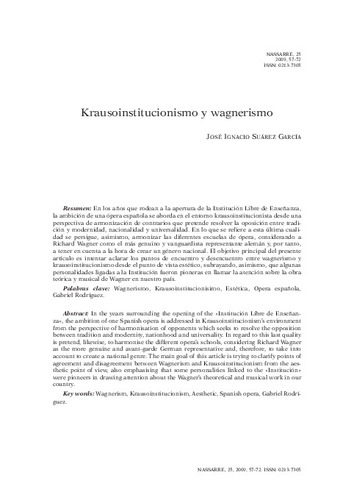Krausoinstitucionismo y wagnerismo
Autor(es) y otros:
Palabra(s) clave:
Wagnerismo
Krausoinstitucionisimo
Estética
Opera española
Wagnerism
Krausoinstitucionism
musical Aesthetic
Spanish opera
Gabriel Rodríguez
Fecha de publicación:
Editorial:
Institución Fernando el Católico
Citación:
Descripción física:
Resumen:
En los años que rodean a la apertura de la Institución Libre de Enseñanza, la ambición de una ópera española se aborda en el entorno krausoinstitucionista desde una perspectiva de armonización de contrarios que pretende resolver la oposición entre tradición y modernidad, nacionalidad y universalidad. En lo que se refiere a esta última cualidad se persigue, asimismo, armonizar las diferentes escuelas de ópera, considerando a Richard Wagner como el más genuino y vanguardista representante alemán y, por tanto, a tener en cuenta a la hora de crear un género nacional. El objetivo principal del presente artículo es intentar aclarar los puntos de encuentro y desencuentro entre wagnerismo y krausoinstitucionismo desde el punto de vista estético, subrayando, asimismo, que algunas personalidades ligadas a la Institución fueron pioneras en llamar la atención sobre la obra teórica y musical de Wagner en nuestro país.
En los años que rodean a la apertura de la Institución Libre de Enseñanza, la ambición de una ópera española se aborda en el entorno krausoinstitucionista desde una perspectiva de armonización de contrarios que pretende resolver la oposición entre tradición y modernidad, nacionalidad y universalidad. En lo que se refiere a esta última cualidad se persigue, asimismo, armonizar las diferentes escuelas de ópera, considerando a Richard Wagner como el más genuino y vanguardista representante alemán y, por tanto, a tener en cuenta a la hora de crear un género nacional. El objetivo principal del presente artículo es intentar aclarar los puntos de encuentro y desencuentro entre wagnerismo y krausoinstitucionismo desde el punto de vista estético, subrayando, asimismo, que algunas personalidades ligadas a la Institución fueron pioneras en llamar la atención sobre la obra teórica y musical de Wagner en nuestro país.
In the years surrounding the opening of the «Institución Libre de Enseñanza», the ambition of one Spanish opera is addressed in Krausoinstitucionism’s environment from the perspective of harmonisation of opponents which seeks to resolve the opposition between tradition and modernity, nationhood and universality. In regard to this last quality is pretend, likewise, to harmonise the different opera’s schools, considering Richard Wagner as the more genuine and avant-garde German representative and, therefore, to take into account to create a national genre. The main goal of this article is trying to clarify points of agreement and disagreement between Wagnerism and Krausoinstitucionism from the aesthetic point of view, also emphasising that some personalities linked to the «Institución» were pioneers in drawing attention about the Wagner’s theoretical and musical work in our country.
In the years surrounding the opening of the «Institución Libre de Enseñanza», the ambition of one Spanish opera is addressed in Krausoinstitucionism’s environment from the perspective of harmonisation of opponents which seeks to resolve the opposition between tradition and modernity, nationhood and universality. In regard to this last quality is pretend, likewise, to harmonise the different opera’s schools, considering Richard Wagner as the more genuine and avant-garde German representative and, therefore, to take into account to create a national genre. The main goal of this article is trying to clarify points of agreement and disagreement between Wagnerism and Krausoinstitucionism from the aesthetic point of view, also emphasising that some personalities linked to the «Institución» were pioneers in drawing attention about the Wagner’s theoretical and musical work in our country.
ISSN:
Colecciones
- Artículos [36139]
- Historia del Arte y Musicología [462]
Ficheros en el ítem




